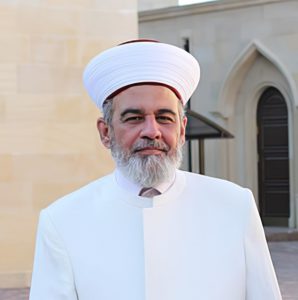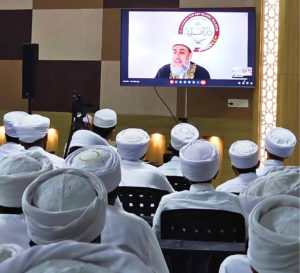All the following could be said:
بسم الله الرحمن الرحيم
Al- Fiqh Al-Akbar
The great Imam Abu Hanifah An-Nu^man said in Al-Fiqh Al-Akbar:
The basis of Tawhid[1] and what constitutes a valid belief is for one to say I believe in Allah, His Angels, His Books, His Messengers, Resurrection after death, Destiny[2] both good and evil and that it is created by Allah, the Settlement of Accounts on the Day of Judgment, the Balance, Paradise and Hellfire. All are true matters.
Allah, the Exalted, is One not in the context of numbers but with the meaning that He has no partners. Allah said in Surah Al-Ikhlas:
قل هو الله أحد الله الصمد لم يلد ولم يولد ولم يكن له كفوًا أحد
This means: Say (O Muhammad) He is Allah, the One clear of partners and anything similar. Allah is the One needed by all and He needs none. He does not beget children and He is not begotten. And there is none, in any way, similar to Him.
He does not resemble any of His creations, and nothing among His creations is like Him. He existed Eternally[3] and exists Everlastingly[4] having His Names and Attributed with the Attributes of His Self[5] and the Attributes of His Doings. As to the Attributes of His Self they are such as Life, Power, Knowledge, Speech, Hearing, Sight and Will. As to the Attributes of His doings they are such as Creating, Giving Sustenance, Insha‘-Creating, Ibda^-Creating, Sun^-Creating and other than that among the Attributes of His Doings.
He existed Eternally and exists Everlastingly having His Names and Attributed with His Attributes. He did not acquire a Name or an Attribute that He did not have. He is Knowledgeable Eternally and Everlastingly by His Knowledge. The Knowledge is His Eternal Attribute. He is Powerful by His Power. The Power is His Eternal Attribute. He Speaks by His Speech. The Speech is His Eternal Attribute. He Creates by His Creating. The Creating is His Eternal Attribute. He Does things by His Doings. The Doing is His Eternal Attribute. The Doer is Allah, the Exalted.
The Doing is His Eternal Attribute and what is done is a created matter. The Doing of Allah, the Exalted, is not created. His Attributes are Eternal without a beginning and not created. The one who claims they have a beginning or are created or doubts or wavers about them, indeed is a blasphemer.
The Qur’an is The Speech of Allah. It is written in the Books of Qur’an, memorized in the hearts, recited by the tongues and descended onto the Prophet sallallahu ^alayhi wa sallam. Our utterance of the Qur’an is created and our writing it is created and the Qur’an is NOT created. What Allah has mentioned in the Qur’an predicating about Musa and other Prophets, sallallahu ^alayhim wa sallam, and about Pharaoh and Iblis, all of that is the Speech of Allah, the Exalted, predicating about them. The Speech of Allah, the Exalted, is not created. The speech of Musa and the other creations is created. The Qur’an is the Speech of Allah and it is Eternal without a beginning, hence it is not their speech. Musa, peace be upon him, heard the Speech of Allah, the exalted, as Allah, the Exalted, said:
وكلم الله موسى تكليمًا
Which means: Allah Spoke to Musa who heard the Eternal Speech of Allah.
Allah,the Exalted, was Attributed with Speech Eternally and yet had not spoken to Musa. Allah, the Exalted,was Attributed with Creating Eternally and yet had not created the creation.
ليس كمثله شىء وهو السميع البصير
This means: Absolutely nothing is like Him and He is Attributed with Hearing and Sight.
When Allah spoke to Musa He spoke to him with His Eternal Speech. All His Eternal Attributes are different from the attributes of the creations. He Knows unlike our knowing, He is Powerful unlike our powerfulness, He Sees unlike our seeing, He Hears unlike our hearing, He Speaks unlike our speech. We speak with instruments and letters but Allah, the Exalted, Speaks without an instrument and without letters. The letters are created and the Speech of Allah is not created. He is a Thing unlike other things. The meaning of a Thing is that His existence is confirmed– clear of bodily attributes, a jawhar-atom of a body, an ^arad-quality of a body, a limit, an opposite, a rival, a similar. He is Attributed with Yad, Wajh, and Nafs. What Allah mentioned in the Qur’an about the Yad, Wajh, Nafs refer to that they are His Attributes without a manner of being[6]. His Yad is His Attribute without a manner of being. His Ghadab[7] and Rida[8] are two of His Attributes without a manner of being.
Allah created the things from no other thing. Allah Knew in Eternity about all things before they were created. Allah Decreed and Created these things. Nothing happens in this world and the Hereafter except by His Will, Knowledge, Creating, and Destining and He ordered all of it be Written in the Guarded Tablet (attribute wise and not judgment wise). Creating, Destining and Will are His Attributes in Eternity without a manner of being.
Allah knows the non-existent thing while in the state of non-existence as non-existent. He knows how it would be had He created it. Allah Knows the existent while in the state of existence as existent. He knows how its annihilation would be. Allah knows the one who is standing, while standing up, as standing up and if one sits He Knows one is sitting while in the state of sitting. All of this is without the Knowledge of Allah changing or Him acquiring knowledge. The change and the different situations occur in the creations.
Allah created the creations empty of blasphemy or belief and then He spoke to them and ordered and prohibited them. The one who blasphemed did so by ones own action and disbelieving in the existence of Allah, all out of Allah’s Will to deprive one of goodness. The one who believed did so by ones own action, admittance and belief, all out of Allah’s Will to guide one to goodness and of support to one.
He took out the offspring of Adam, peace be upon him, from his back in forms as tiny as the small red ants and made them mindful. He spoke to them and ordered them to believe and prohibited them from blasphemy. They admitted to Him that He is the Owner of all things and thus were established as believers, hence they are born with Fitrah[9]. So after that, whoever blasphemes has in fact changed and altered and whoever becomes a believer and believes has remained steadfast and lasted. He did not force any of His creations to blaspheme or believe and did not create them believers and blasphemers, rather He created them as persons; belief and blasphemy are the doings of the slave. Allah Knows whoever blasphemes, while in the state of blasphemy, as a blasphemer, and if one believes after that He knows him, while in the state of belief, as a believer, without a change in the Knowledge and Attribute of Allah. All the doings of the slaves among motion and rest, they truly acquire, and Allah is their Creator, and all of them are by the Will, Knowledge, Creating and Destining of Allah.
The acts of obedience no matter what they entail are due by the Order of Allah, the Exalted, His Love[10], Acceptance, Knowledge, Will, Creating and Destining. All the sins are by His Knowledge, Creating, Destining and Will but not by His Love[11], Acceptance and Order.
All of the Prophets, sallallahu ^alayhim wa sallam, are clear of minor sins[12], enormous sins and abhorrent matters. Some errs and faults occurred from them. Muhammad, the Messenger of Allah, sallallahu ^alayhi wa sallam, is His beloved, slave, Prophet and Choicest. He did not worship an idol and did not associate partners with Allah not for a blink of an eye. He never did commit a minor[13] or a major sin.
The best of the people after the Prophets, sallallahu ^alayhim wa sallam, is Abu Bakr As–Siddiq, may Allah accept his deeds, thereafter ^Umar Ibn Al-Khattab, thereafter ^Uthman Ibn ^Affan, thereafter ^Ali Ibn Abi Talib, may Allah accept all of their deeds and keep them strolling with truth and make us support them in the truth. We do not speak ill of the companions and we do not judge a Muslim as a blasphemer for any of the sins, even if enormous, unless one deems it lawful. We do not remove him from the nomenclature of a believer, and call him truly a believer, and he could be a believer committing iniquities but not a blasphemer.
Wiping over the Khuff-foot gear is sunnah[14] and tarawih prayers in Ramadan are sunnah. Praying behind every pious and committer of iniquities is permissible.
We do not say that the believer is not harmed by sins, and we do not say that he does not enter Hellfire, and we do not say that he remains therein forever even if he used to be a blasphemer, as long as he departs this life as a believer. We do not say our good deeds are accepted and our sins are forgiven, as the Murji’ah[15] say. But we say the one who does a good deed, satisfying all its conditions and is clear of the invalidating defects and matters and does not invalidate it by blasphemy and apostasy until one departs this life, is a believer, and then Allah will not make it wasted for him, rather He accepts it from him and rewards him for it. Whatever sins one commits less than associating partners with Allah and blasphemy and does not repent from them until he dies as a believer, then he is under the Will of Allah, if Allah Wills, He will torture him in Hellfire and if He Wills forgives him and does not torture him in Hellfire, fundamentally speaking.
Should insincerity infiltrate one of the deeds it nullifies its reward, and likewise arrogance. Miracles are confirmed for the Prophets and the supernatural-karamas doings are truthful for the highly pious-waliyys.The extraordinary doings that occur from the likes of Iblis, Pharaoh and the Imposter, which were mentioned in the religious reports that they happened or will happen, we do not call them miracles or supernatural-karamas doings. Rather we call them fulfillment of needs for them, because Allah fulfills the needs of His enemies with the purpose of leading them for the punishment they deserve, and as a punishment for them, so they become satisfied in deceit and exaggerate in sinning or blasphemy, and all of that is possible and permissible.
Allah the Exalted was Eternally a Creator before He created things and was Eternally a Sustainer before providing sustenance.
Allah the Exalted will be seen in the Hereafter. The believers will see Him while they are in Paradise with their eyes without likening Allah to the creations, without a manner of being, without a volume and there will not be a distance between Him and His creations.
The belief is admitting and believing. The belief of the occupants of earth and heavens does not increase or decrease as far as the One believed in is concerned, and increases and decreases as far as ones degree of certainty and belief are concerned. The believers are equal in the belief and excel in deeds. Islam is submitting and following the orders of Allah the exalted. Linguistically there is a difference between belief and Islam, however, there is no belief without Islam and Islam does not exist without belief for they are together like the front and the back of the thing. The religion is a name that encompasses the belief, the Islam and the entire rules revealed to the prophets.
We know Allah with the knowledge that is due to Him and as per the Attributes He Attributed to His Self. No one can worship Allah the worship due to Him that He is entitled to, but rather one worships Him in fulfillment of His Orders and as He ordered.
The believers are equal[16] about Allah in knowledge, certainty, reliance, love, acceptance, fear, hopefulness, belief and differ in all what is less than this.
Allah, the exalted, is generous to His slaves and is Just. He might reward the slave many folds of what he deserves out of His generosity, and might punish for the sin out of His justice or forgive it out of His generosity. The intercession of the Prophets, sallallahu ^alayhim wa sallam, is confirmed for the sinners and committers of enormous sins among the believers who deserve punishment. Weighing the deeds on the Balance on the Day of Judgment is true and the settlement of the dues between the plaintiffs and defendants is true, and it is permissible that if they had no good deeds of their own, the sins of the other party will be added to them. The Basin of the Prophet, sallallahu ^alayhi wa sallam, is true. Paradise and Hellfire are now created and shall never annihilate, and the Huril^in-women shall never annihilate. The torture of Allah shall never annihilate and the reward of Allah lasts forever. Allah, the Exalted, guides whomever He willed out of His generosity, and makes misguided whomever He willed out of His Justice. Making one misguided entails depriving one of goodness; that is the slave will not be guided to the deeds that Allah accepts from one. This is justice from Allah. Likewise, the punishment for the sin of the deprived one is justice from Allah.
It is not permissible to say that the Devil takes away the belief from the believing slave forcefully and out of subjugation, rather we say the slave becomes lose with the belief and if one leaves it at such an instance, the Devil takes it away from one.
The questioning of Munkar and Nakir is a true matter that takes place in the grave. The return of the soul to the body of the slave in the grave is true. The pressing of the grave and the torture therein is true for all the blasphemers and for some sinful believers.
Proximity and being far from Allah are not matters of length or shortness of distance, rather they are meanings pertaining to one being favored with acceptance or deprived by being unaccepted. The one who is obedient is close to Him without a manner of being, and the sinful one is far from Him without a manner of being. Proximity, being far and coming forth fall on the supplicating one. Likewise, being in the jiwar[17] of Allah in Paradise and standing between His Yadayh[18] are without a manner of being.
The Qur’an was sent down onto the Prophet, sallallahu ^alayhi wa sallam, and is written in the books. All the verses of the Qur’an are equal in merit and greatness, except some have the merit of recitation and some have the merit of who is mentioned in them. Like the ayah of Al-Kursi, because who is mentioned in it is the Glory and greatness of Allah and His Attributes. Hence, two merits are combined in it, the merit of the recitation and the merit of who is mentioned in it. Some of the verses have only the merit of reciting, such as the tale of the blasphemers, so who is mentioned in it has no merit and they are the blasphemers. Likewise, the Names and Attributes are equal in greatness and merit with no excellence of one over the other between them.
Qasim, Tahir and Ibrahim were the sons of the Prophet, sallallahu ^alayhi wa sallam. Fatimah, Ruqayyah, Zaynab, Umm Kulthum were all the daughters of the Prophet sallallahu ^alayhi wa sallam, May Allah Accept the deeds of all of them.
If one is perplexed about something among the delicate matters of the science of Tawhid[19], one is ought to immediately believe what is correct about Allah, the Exalted, until one finds a scholar and asks him, and one is not entitled to delay.
The news of the Ascension is true and the one who rejects it is deemed a misguided blasphemer. The appearance of Gog and Magog, and the sunrise from the Westside, and the decent of ^Isa, peace be upon him, from the sky, and the rest of the signs of the Day of Judgment according to the authentic reports, are true and shall happen. Allah, the Exalted, guides whomever He willed to a straight path.
The text of Al-Fiqh Al-Akbar for the great Imam Abu Hanifah, may Allah accept his deeds, ends here. Some terms used here might be different due to the different copies of the text.
Translated by Riad Nachef, Ramadan 6th, 1426AH…Oct 10th, 2005
[1] The knowledge about Allah and His Messenger.
[2] Destiny is used here to denote the things created by Allah whether good or evil. Allah creates these things as per His Destining — an Eternal and Everlasting Attribute of Allah . Hence we do not say about the Destining of Allah evil.
[3] The status of existence without a beginning.
[4] The status of existence without ending.
[5] Refers to the Reality of Allah.
[6] A manner of being refers to all what could be an attribute of the creation.
[7] Ghadab is an Attribute of Allah pertaining to non-acceptance of deeds and punishment.
[8] Rida is an Attribute of Allah pertaining to acceptance of deeds and reward.
[9] Refers to the inherent readiness after birth to accept the call of Islam.
[10] When Love is Attributed to Allah it refers to acceptance of deeds and reward and NOT emotions and reactions; Allah is clear from that.
[11] See footnote 5
[12] This refers to the small abject sins that constitute meanness. It is possible for Prophets to commit non abject small sins but they are guided to immediately repent from them before others follow their pursuit.
[13] See footnote 12
[14] Recommended and not obligatory.
[15] A well known deviant group who strayed in the matter of the Islamic creed.
[16] That is fundamentally as far as the essence of the aforementioned matters is concerned.
[17] Jiwar means one would be enjoying the endowments that Allah endows on one in Paradise—all being owned by Allah .
[18] Standing between His Yadahy reflect when one stands on the Day of Judgment to face the settlement of ones account and to be judged.
[19] The knowledge about Allah and His Messenger.





